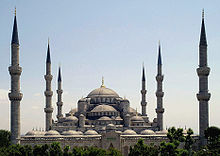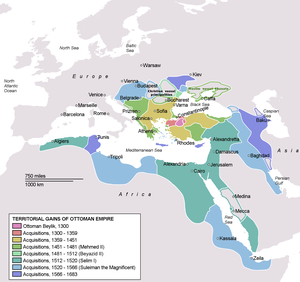Turkish people
The Turkish people (Turkish: Türkler), or Turks, are the world's largest Turkic ethnic group; they speak different dialects of the Turkish language and live mainly in Turkey and Cyprus. There are Turkish communities in the Balkans as well.
Türkler | |
|---|---|
 Map of the Turkish people in the world | |
| Total population | |
| c. 80 million | |
| Regions with significant populations | |
| 3,000,000 to over 7,000,000[4][5][6][7] | |
| 3,000,000–5,000,000[48][49][50] | |
| 1,000,000–3,000,000[8][9][10][11] | |
| 1,000,000–1,700,000g[51][52] | |
| 1,000,000–1,400,000h[53][54] | |
| 500,000 to over 2,000,000[12][13][14][15] | |
| over 1,000,000[16][17][18 | |
| 588,318–800,000[62][63][64] | |
Culture
Religion

Turkish people are predominantly Sunni Muslims, the largest branch of Islam. Many Turks are practising its Hanafi denomination. The most followed branch after Sunnism is Alevism-Bektashism, few belive in Tengrism.
Traditions
Turkish traditions can be found in Turkey but can also be found in other Turkic countries. This includes Turkish Oil Wrestling, Sünnet-Partys of Boys, Belly dance, Karakucak Guresh, Camel wrestling etc.
Diaspora

They are a big Turkish diaspora. There are also large Turkish minorities in the Balkans, the Caucasus, and the Arab world.
Turkish people are the largest minority group in Bulgaria. There are large Turkish communities in the Western Thrace region of Greece, the Dobruja region of Romania, the Akkar region in Lebanon as well as in North Macedonia. Turkish people are also the largest ethnic minority group in Austria, Denmark, Netherlands, and in Germany (see Turks in Germany).